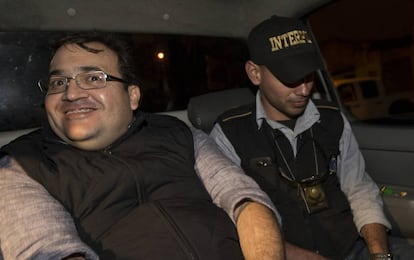How fugitive Mexican ex-governor Javier Duarte was finally arrested
Politician from the ruling PRI fled Veracruz in October after being charged with corruption

Javier Duarte, the disgraced former governor of the Mexican state of Veracruz who has been on the run for the last six months, was captured on Saturday and is now in prison in Guatemala awaiting extradition.

Duarte, 43, has become a symbol of the rampant corruption and impunity of Mexico’s politicians, and was arrested on Saturday evening local time at a hotel on Lake Atitlán. The Guatemalan authorities said that Duarte had been staying at La Riviera for two nights under a false name and was arrested without a struggle.
Images of Duarte, once tipped as a possible presidential candidate for Mexico’s ruling Institutional Revolutionary Party, show a man who has put on several kilograms during his time on the run, and he is pictured smiling as he is driven away by Guatemalan security forces.
The timing of the arrest of Duarte has been questioned
The timing of his arrest, just six weeks ahead of a crucial election in the state of Mexico, which the PRI could lose control of for the first time in 90 years, has been seen as convenient by some commentators.
The former governor of Veracruz fled on October 13 after a judge ordered his arrest. Duarte had resigned from his post a few days earlier saying he needed to defend himself against a range of accusations that included links to organized crime and drug traffickers and money laundering.
He is accused by the State Attorney’s office of embezzling public funds.
Opposition leaders have called for Duarte to be brought back to Mexico immediately. At the same time, senior PRI figures such as Alfredo del Mazo, the governor of Mexico state, are calling the arrest proof of the government’s commitment to fighting corruption.
“The actions of the government of the Republic and President Enrique Peña Nieto show that Mexico is changing,” said a government statement issued following Duarte’s arrest.
Since Duarte took office, Veracruz has been locked in an increasing spiral of violence. Two months before he fled, the country’s largest mass grave was discovered on the outskirts of the port city of Veracruz, containing at least 250 bodies. Fighting between two rival drugs cartels, Los Zetas and the Jalisco Nueva Generación, increased after Duarte’s arrival in office in 2010, while attacks on journalists rose sharply: 17 reporters died between 2010 and 2017.
Under Duarte, Veracruz descended into violence and financial mismanagement
Duarte’s successor, Miguel Ángel Yunes of the center-right National Action Party (PAN), inherited a €2.4 billion debt.
The arrest of Duarte comes a week after that of Tomás Yarrington, a former PRI governor of the state of Tamaulipas who has been on the run for five years. He was indicted by the US in 2013. The Mexican authorities want him on charges of organized crime and money laundering, among others. At least 20 state governors have been investigated over the last 11 years, or have been arrested or fled justice.
The rise and fall of figures such as Duarte and Yarrington are just two examples of how Mexico’s political parties have been prepared to look the other way in the face of corruption. Now, the PRI is making play of having expelled the two governors from its ranks, although it should be remembered that in the case of Yarrington this did not happen until December, until which time he had eight bodyguards assigned to him.
In March, a Mexican judge issued an arrest warrant for former Chihuahua state governor Cesar Duarte, also a member of Nieto’s ruling party, on suspicion of embezzlement.
English version by Nick Lyne.
Tu suscripción se está usando en otro dispositivo
¿Quieres añadir otro usuario a tu suscripción?
Si continúas leyendo en este dispositivo, no se podrá leer en el otro.
FlechaTu suscripción se está usando en otro dispositivo y solo puedes acceder a EL PAÍS desde un dispositivo a la vez.
Si quieres compartir tu cuenta, cambia tu suscripción a la modalidad Premium, así podrás añadir otro usuario. Cada uno accederá con su propia cuenta de email, lo que os permitirá personalizar vuestra experiencia en EL PAÍS.
¿Tienes una suscripción de empresa? Accede aquí para contratar más cuentas.
En el caso de no saber quién está usando tu cuenta, te recomendamos cambiar tu contraseña aquí.
Si decides continuar compartiendo tu cuenta, este mensaje se mostrará en tu dispositivo y en el de la otra persona que está usando tu cuenta de forma indefinida, afectando a tu experiencia de lectura. Puedes consultar aquí los términos y condiciones de la suscripción digital.








































